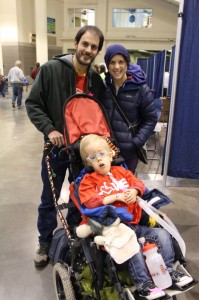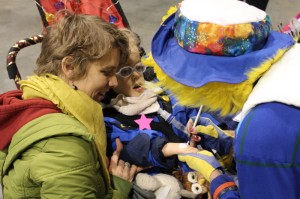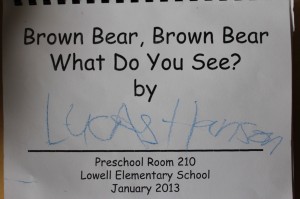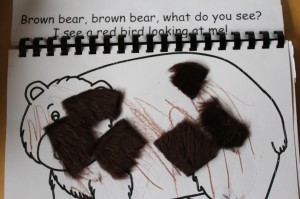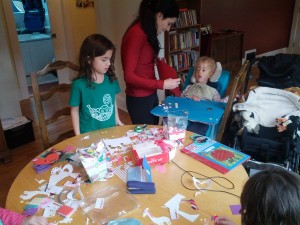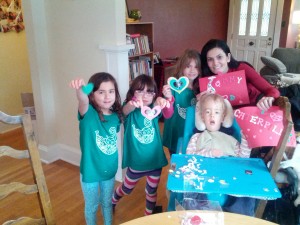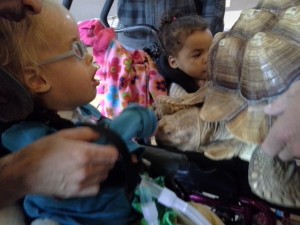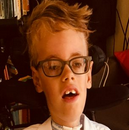This weekend we’re participating in the MDA “Muscle Walk”. Most people have at least heard of the Muscular Dystrophy Association and for some, like us, it probably evokes uncomfortable connections with “Jerry’s Kids” and the infamous telethons featuring Jerry Lewis. According to its website, the MDA is “the nation’s largest voluntary health agency dedicated to funding neuromuscular disease research, health care services and education.” Though education, direct support services and advocacy are listed among the programs that the MDA participates in, it’s clear that most of the money raised actually goes towards research.
The truth is, we were pretty ambivalent about participating in the Muscle Walk given that the MDA’s politics around disability don’t really jive with ours. But we also see it as an important opportunity to connect with and be around other families of kids with special needs. It’s been really good for Lucas to be around other wheelchair users and for us to meet and learn from other people who deal with muscle disease in their lives.  Also, we do believe that raising money for disease research is very important, even if it’s not where much of our energy around disability rights and disability justice has been directed.
Also, we do believe that raising money for disease research is very important, even if it’s not where much of our energy around disability rights and disability justice has been directed.
So…. we’re not doing an all-out fundraising campaign, but we would appreciate your support as we are try to raise up to $500 that will go to research around MTM. You can donate to Team Lucas here. And if you’re in the Seattle area please join us at 9:30 am on Saturday at CenturyLink field.
For those who are curious, here’s a little more background around the controversy surrounding the MDA and Jerry Lewis (with help from Wikipedia). The MDA has been criticized by disability rights activists for their tendency to paint disabled people as “pitiable victims who want and need nothing more than a big charity to take care of or cure them.” (The quote comes from the critical documentary film The Kids Are All Right which you can watch online.) By focusing attention on medical cures which would “normalize” disabled people, the MDA has failed to address issues like providing accessible buildings and transportation, employment opportunities and other civil rights.
Though we are excited about some of the research breakthroughs related MTM — which we plan to report on in subsequent blog posts — we continue to be most inspired by organizations and individuals who fight for accessibility and policy changes that benefit people with disabilities. On a practical level, we recognize that the MDA and other organizations have poured millions and millions of dollars into research over many decades and yet there still is not a cure for Muscular Dystrophy, or for any other significant muscle disease for that matter. Meanwhile, other struggles have been fought and won that make life better for people living with disabilities. On a personal level, we recognize that Lucas’s life may be impacted by a possible treatment or cure for MTM, but its just as likely that it won’t, and therefore we’re much more interested in doing all we can to help make his life fulfilling, knowing that he has very weak muscles. Finally, on a political level we’re into challenging and changing systems of oppression, such as the way that people with disabilities are often excluded from various places and institutions. Even if a cure is found for Lucas’s particular muscle disease, millions of other people will continue to face oppression within a society that still excludes and discriminates against people with disabilities. And if a drug treatment is developed, it will be costly and likely inaccessible to many, at least initially.
All that said, we’re fortunate to live in a world (and a political sub-culture) that has been so influenced by the serious pride that has been an important part of the disability rights movement. So we’re going to the “muscle walk” this weekend with a little bit of trepidation about the institution, but also lots and lots of pride for Lucas and all the kids and families celebrating their full, wonderful, complex lives with disabilities. If you come, look for the family that is rolling along, waddling like penguins and singing Brown Bear Brown Bear at the top of our lungs.
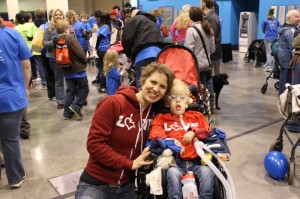 s really liked meeting the “robots” (people in full Star Wars costumes), a cowboy, a face-painting clown, and another little boy’s service dog, Zoe. He was especially excited about the sparkly panda the clown painted on his hand.
s really liked meeting the “robots” (people in full Star Wars costumes), a cowboy, a face-painting clown, and another little boy’s service dog, Zoe. He was especially excited about the sparkly panda the clown painted on his hand.